1. Feeding Wildlife in National Parks

Think tossing a few breadcrumbs to that chipmunk is harmless? Think again. In 2025, rangers in several national parks are cracking down harder on visitors feeding animals, with fines reaching up to $500. It might feel like a friendly gesture, but it disrupts natural behaviors and puts both humans and animals at risk.
This surge in enforcement comes after a spike in animal-human encounters that resulted in injuries and damage. Bears that become accustomed to food from humans can become aggressive, leading to relocation or euthanasia. Even feeding birds is off-limits in many areas now. The law isn’t new—but the enforcement definitely is.
2. Camping Outside Designated Areas
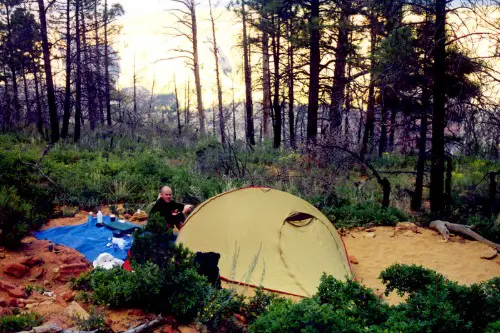
Backcountry camping sounds adventurous, but going rogue with your tent can get you a hefty fine in 2025. Several states, especially in the West, have updated regulations to protect sensitive ecosystems. Authorities are enforcing stricter camping boundaries, and even first-time offenders are being ticketed. The fines can vary but often start at around $250.
This shift is in response to growing problems with erosion, trash, and damage to wildlife habitats. Off-grid camping has become more popular thanks to social media, but parks are struggling to handle the pressure. Rangers are using drones and satellite tech to locate illegal campsites. So even if you think you’re deep in the woods, someone may still be watching.
3. Flying Drones in Restricted Airspace
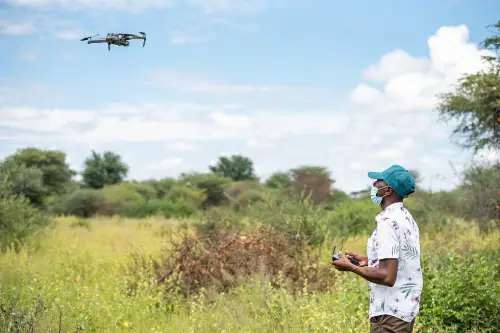
Drone footage of natural landscapes is cool—but not always legal. In 2025, more cities and national parks have updated their no-fly zones, and enforcement is catching hobbyists off-guard. Fines for unauthorized drone use can go as high as $5,000, especially near wildlife or populated events. Even beaches and suburban parks now have rules in place.
These rules are meant to protect privacy, wildlife, and air safety. Eagles and other large birds have been injured in drone incidents, and nesting areas are particularly sensitive. In urban areas, drones have interfered with emergency helicopters. If you’re not 100% sure it’s allowed, it’s best to keep your drone grounded.
4. Having Fires During Burn Bans
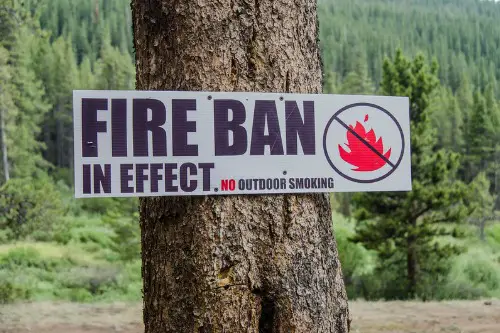
Yes, a cozy fire under the stars is iconic—but it could cost you. Due to worsening wildfire seasons, many counties have declared more frequent and longer-lasting burn bans. Violating a burn ban in 2025 can get you fined up to $1,000 or more, even if you’re using a fire pit. Enforcement now includes random ranger patrols and satellite detection.
Burn bans aren’t just for wildland areas anymore—they often apply to private campgrounds and residential areas. The rules also cover fireworks, charcoal grills, and even tiki torches in some states. With climate change making fire conditions more extreme, there’s little tolerance for even small flames. Authorities are treating it like reckless endangerment.
5. Collecting Rocks, Plants, or Artifacts

That pretty rock or desert flower might be tempting to pocket, but you could be breaking the law. Many protected areas now have increased fines for collecting natural or cultural materials. In 2025, taking home even a small souvenir can cost you upwards of $500. The laws are especially strict in places like deserts, national monuments, and historic sites.
Authorities say people often don’t realize they’re contributing to long-term damage. One person taking one rock might not matter—but thousands doing it over time? That creates erosion, habitat loss, and cultural disrespect. It’s now common to see signs warning visitors not to “take anything but pictures.”
6. Off-Leash Dogs on Trails

Bringing your pup to the trail? Make sure that leash is on—rangers are handing out $200+ fines for off-leash dogs in 2025. More hikers have complained about dog attacks, wildlife harassment, and trail conflicts, leading to tighter rules and more patrols. Even in dog-friendly parks, leash laws are stricter now.
The problem isn’t just annoyance—it’s safety. Off-leash dogs can provoke bears, disturb nesting birds, or scare other visitors. There have been recent reports of unleashed dogs falling from cliffs or needing rescue. Local governments are saying: if your dog can’t hike on a leash, it shouldn’t hike.
7. Cliff Jumping and Swimming in Restricted Areas

Jumping into that crystal-clear lake from a high rock may look like a movie scene—but it’s often illegal. In 2025, many popular swimming holes have stricter rules about cliff jumping and even swimming in general. Injuries and fatalities from poorly judged jumps have led to $250+ fines for violators. Even wading is banned in some reservoirs and protected streams.
These areas may look inviting, but often hide strong currents, submerged rocks, or sensitive habitats. Emergency rescues are costly and dangerous for everyone involved. Officials are posting clearer signs and even deploying drones to spot rule-breakers. Don’t assume it’s okay just because there’s no lifeguard around.
8. Sleeping in Your Car Overnight
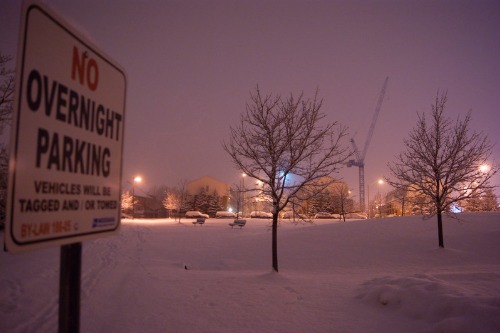
The rise of van life has sparked a backlash from local governments. In 2025, more cities and counties are ticketing people who sleep overnight in their vehicles, especially in residential or park-adjacent areas. Fines range from $75 to $300 depending on the jurisdiction. Signs that once said “No Overnight Parking” are now backed by active enforcement.
Residents have voiced concerns about trash, noise, and safety near popular overnight spots. In some areas, designated lots exist, but they often require permits. Many people assume rest areas are always safe—but even those now have 8-hour limits in some states. It’s become crucial to know the rules before pulling over to sleep.
9. Mountain Biking on Hiking-Only Trails
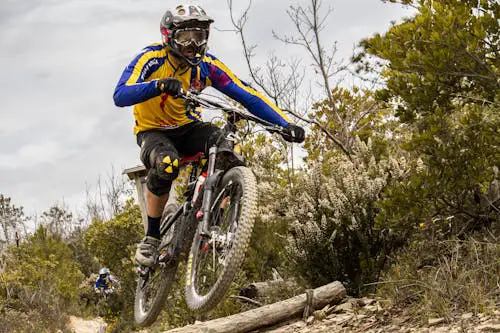
That trail might look perfect for your bike, but it might not be legal. In 2025, several public lands have increased fines for mountain biking on hiking-only or multi-use trails. Enforcement has ramped up due to collisions, erosion, and complaints from hikers. Riders caught on restricted trails face fines starting around $150.
Many trails are marked clearly, but some bikers still take the risk for the adrenaline rush. The result? Trail damage and confrontations with other users. Agencies are now using cameras and GPS tracking to monitor bike activity in sensitive areas.
10. Fishing Without a License
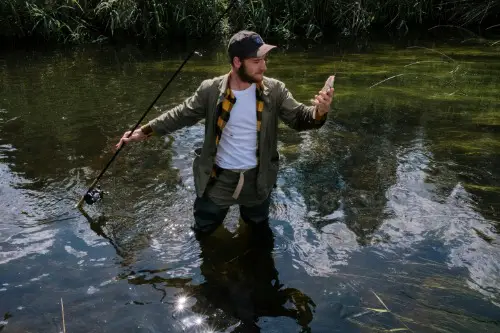
Whether you’re casting a line in a lake or river, you’d better have that license handy. States have stepped up patrols in 2025, and fishing without proper documentation can get you fined $100 to $500. Even catch-and-release fishing often requires a license now. Some states also require separate stamps for certain species.
The increase in fines is meant to protect overfished ecosystems and ensure sustainable recreation. Authorities say too many people assume casual fishing doesn’t count. But even short, recreational trips impact fish populations. The days of fishing without paperwork are over.
11. Off-Roading in Closed Areas

Taking your ATV or Jeep into the wild? Make sure it’s not a closed trail. In 2025, land managers have closed more routes due to erosion and damage—and the fines for illegal off-roading now top $1,000 in some federal lands. Cameras, drones, and roadblocks are helping rangers spot violators faster than ever.
Many of the closures are temporary but necessary to recover damaged habitats. Still, enthusiasts keep pushing boundaries, thinking they’ll go unnoticed. This has led to habitat destruction, especially in desert and alpine regions. The message is clear: stick to marked trails or pay up.
12. Littering—Even Accidentally

Dropping a granola bar wrapper might seem minor, but it can cost you big. In 2025, many park authorities have added “zero-tolerance” littering enforcement policies. Even if something falls out of your pocket by accident, you could be looking at a $200 ticket. Rangers and volunteers are increasingly logging litter incidents with photos.
This comes after a pandemic-era boom in outdoor use left trails and parks overflowing with trash. The consequences go beyond looks—litter harms wildlife, spreads disease, and pollutes water sources. Some places are even using surveillance cameras in problem areas. If it’s not in your pack, it’s on your record.
13. Using Unauthorized E-Bikes

Electric bikes are booming, but they’re not allowed everywhere. In 2025, many trail systems differentiate between pedal-assist and throttle-powered bikes, and riding the wrong kind can earn you a $100–$250 fine. Some trails allow only Class 1 e-bikes, which assist only when you’re pedaling. Using a Class 2 or 3 bike can violate local motorized vehicle laws.
The problem is that many users don’t realize the distinctions, or they assume park staff won’t check. But as trail traffic increases, authorities are prioritizing quiet, non-motorized spaces. Faster bikes raise collision risks and damage soft trail surfaces. If your e-bike has a throttle, double-check the rules before hitting the trail.
14. Loud Music or Amplified Sound in Public Parks

Bringing your speaker to the park? You might want to leave it in the car. In 2025, more municipalities are banning loud or amplified sound in public green spaces, especially in the early morning or evening hours. Fines for violating sound ordinances range from $50 to $500 depending on the location.
These rules are designed to reduce noise pollution and respect other visitors’ experiences. People come to parks to relax, not to listen to your playlist. Even fitness instructors leading outdoor classes are required to get permits for amplified audio. If you’re planning to bring a Bluetooth speaker, it’s safer to wear headphones.
This post 14 Outdoor Activities Americans Are Getting Fined for in 2025 was first published on American Charm.


